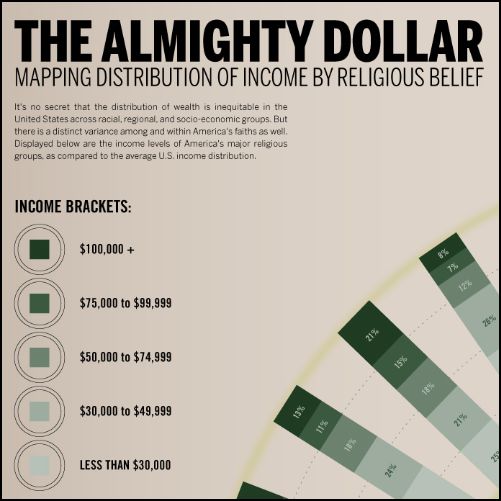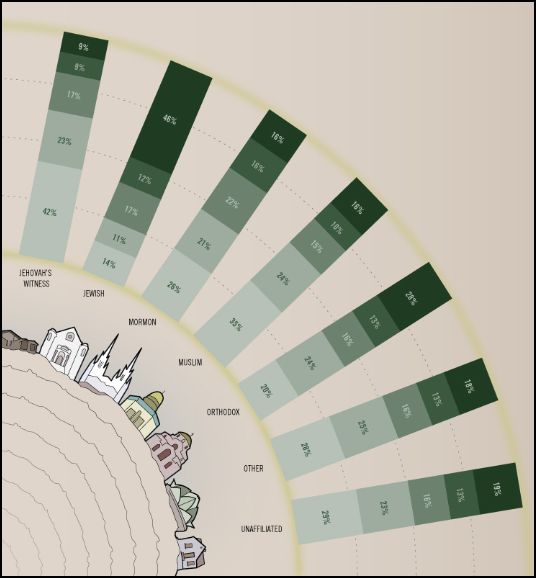Religion is the sigh of the oppressed creature, the heart of a heartless world, and the soul of soulless conditions. It is the opium of the people. The abolition of religion as the illusory happiness of the people is the demand for their real happiness.
With these words Karl Marx condemned religion for making the class-disadvantaged masses complacent in the face of injustice. New data from the Pew Forum, sent in by Dmitriy T.M. and Allie B., suggests that this may be true for some religions more than others!
Visual at GOOD, shown here in three parts:
Allie was actually quite troubled by this figure, arguing that it affirmed stereotypes that Jews controlled all the money and encouraged people of different religions to see each other as competition.
Indeed, how we choose to present data is always a political decision. Why correlate religion with income at all? Maybe religion is somewhat spurious, compared to variables like geographic location, race, or immigration status. That is, it may be that income correlates with geography, race, and immigration status and those variables correlate with religion.
It’s pretty tricky to figure these things out (and that’s why we force sociology graduate students to learn fancy statistical methods), but in the end we still can’t attribute causality, just correlation. Figuring out why and how things correlate requires qualitative of research.
Lisa Wade, PhD is an Associate Professor at Tulane University. She is the author of American Hookup, a book about college sexual culture; a textbook about gender; and a forthcoming introductory text: Terrible Magnificent Sociology. You can follow her on Twitter and Instagram.



Comments 81
Kat — March 5, 2010
"Allie was actually quite troubled by this figure, arguing that it affirmed stereotypes that Jews controlled all the money"
...or Hindus for that matter.
I think the geography part is slightly silly. Why not rather explain the underlying cultural and historic reasons for the wealth of certain subgroups?
Simone — March 5, 2010
Speaking as a Jew, I'm not bothered by the fact that the graph "promotes stereotypes." I feel that the graph presents information in a fairly neutral way.
On the other hand, I am bothered by the fact that it's almost impossible to read!
Anon Y. Mouse — March 5, 2010
"...and encouraged people of different religions to see each other as competition."
People of different religions pretty much DO see each other as competition. No one will say it out loud, of course.
Coming from a Hindu family (though I'm atheist), you'd be hard pressed to convince my dad that Muslims or Christians aren't in competition with us.
CLM — March 5, 2010
I remember reading Weber's Capitalism and the Protestant Ethic and he had some pretty interesting figures about Protestants tending to be wealthy capitalists due to their work ethic that stemmed from the "calling". I wonder if those graphs would read any different if it separated all the Christian groups out.
Fangirl — March 5, 2010
I'm quite fascinated by this data, honestly, particularly the statistics in regard to Jehovah's Witnesses, who have the second-highest percentage making under $30,000, after historically Black churches.
It's easy to point out structural inequalities and systematic oppression working against members of historically Black churches.
Why do 64% of Jehovah's Witnesses make less than $50,000? I think this could be a great illustration of the economic impact of being a Jehovah's Witness, and the level of dedication that the belief system requires. (I'm not attacking Jehovah's Witnesses, nor their beliefs, just making an observation.) "Mainline" Christianity is pretty broad, and so I imagine the amount of time and energy required by the church is pretty broad, ranging from extremely high to showing up on Sundays, but Jehovah's Witnesses have demanding requirements about attending meetings and witnessing, which I imagine severely hamper participation in high earning, time consuming careers. (Additionally, Jehovah's Witness youth are discouraged from attending college, creating an additional barrier to careers with generous income.)
What to do with this information? You know, I have no idea. I'm just providing possible reasons for the data we got.
(Quick disclaimer: At the risk of pulling the "but I have _____ friends" card, my best friend is a Jehovah's Witness, I've been to a meeting, I read the magazines, etc. All of this info about requirements and college and whatnot comes from the magazines, both the "public" one they hand out and the "private" one used for study by Jehovah's Witnesses.)
Lola — March 5, 2010
I think that this chart is meaningful and should not be viewed with concern because of the fact that a higher percentage of Jews are wealthy. To understand this distribution, I think it makes more sense to think about why the wealth is *lower* for the other groups. Some faiths, like Judaism, and, I think (correct me if I am wrong) are not evangelical and do not attempt to convert people not born into the faith. On the other hand, a lot of evangelical Christian denominations place great emphasis on missions, conversion, and outreach. The evangelical message salvation, redemption, and a direct, personal relationship to God no matter one's earthly station, is appealing to disenfranchised and marginalized people. The poor generally feel disenfranchised and marginalized. This would explain higher rates of poverty in these churches. (What I am trying to say is that Judaism doesn't *cause* wealth and evangelical Christianity doesn't *cause* poverty. Rather, the message and evangelism inherent to many Christian denominations attracts more marginalized (and poor) people.)
For instance, the fastest growing religion in impoverished parts of the world is Pentecostalism and its charismatic variants. Mike Davis' *Planet of Slums* has a great discussion of this phenomenon.
Deaf Indian Muslim Anarchist — March 5, 2010
what a bullshit study. They didn't break down Muslims into racial groups.
a lot of Indian Muslims and Pakistani Muslims in the States are VERY wealthy, well educated and financially prosperous, much moreso than other Muslim American groups!
I know this because I'm South Asian and Muslim!
REAvery — March 5, 2010
This may be tangential, but it bothers me that this graph uses "Christian" as a synonym for "Protestant." Technically, Catholics and Orthodox (and some would include Jehovah's Witnesses and Mormons) ARE Christian denominations, but only the Protestants get to be called Christians.
Labeling the Protestant groups Christians, but not Protestants, and specifically NOT labeling other Christian groups as Christians, sets Protestant as the "standard Christianity," which isn't true.
Muriel Minnie Mae — March 5, 2010
Religion may have been the opiate of the masses in Marx's time but sports have taken religion's place now.
KarenS — March 5, 2010
Where do they categorize non-believers, if they included them at all? I'm an atheist, and I hate disappearing behind labels like "other" and "unaffiliated". I don't belong to an "other" religion, I belong to no religion at all. And "unaffiliated" sounds like it's for people who believe in a god or some faith-based system, but don't belong to an organized group.
Please stop ignoring me!
(Last remark not directed toward SocImages, but toward studies like this that like to pretend I don't exist.)
fromthetropics — March 5, 2010
Yeah. Shouldn't they have 'atheists' too? Since many of the atheists I've met seem to hold on to their beliefs just as strongly as though it was a type of 'faith' of it's own as opposed to just being a loose 'other' or 'unaffiliated' freethinker.
av — March 5, 2010
what's missing in the charts is a correlation between religion/income and overall percentage of population. isn't it true that in the US, 25% of the population is catholic, and only 1.2% jewish? doesn't that temper the figures presented here?
The Flash — March 5, 2010
I think the OP is right on with the geography issue: Jews in the U.S. almost all live in major metropolises: New York, L.A, Miami, Chicago. These are all places that have higher costs of living than average. Probably ditto to Hindus. I'm skeptical of the motives of whoever did this study.
They should also probably put this side-by-side with the education statistics (Jews and Hindus come in second and first for advanced degrees, too).
Whole thing stinks.
NancyP — March 5, 2010
Being a Jew has two aspects, ethnic identity and religious affiliation. Almost all individuals identifying as Jewish have the ethnic identity, but significantly fewer also have the religious affiliation. The number of Jews who don't claim ethnic identity but do have religious affiliation (ie, converts) is quite low. The comparison with Christian denominations is inappropriate, since most people of Christian ancestry (in this country) identify as "not affiliated" if they aren't religious (atheist, agnostic, just not interested).
As someone mentioned above, Jews and Hindus also have the highest rate of postgraduate education, which correlates reasonably well with increased income.
Jews and Hindus live everywhere. There's a substantial sub-population of highest-quintile immigrant Hindus in the smaller cities and rural towns that may not have much draw for American-born physicians. Physicians can avoid the lottery and get green cards if they work for a certain number of years in hard-to-recruit sites run by the federal government or its subcontractors. VA hospitals, prisons, remote populations (Indian Health Service in western states and Alaska), very poor rural areas and mid-sized towns located far from major cities, all these sites often are staffed by immigrants with the specialized visa.
styleygeek — March 5, 2010
Another factor that I think probably correlates with religion and influences wealth is number of children. That is tied up with ethnicity/culture and education too, so difficult to untangle, but I know that some religions and religious denominations encourage large families and/or discourage birth control.
Meera — March 5, 2010
It's become increasingly common for Hindus (especially second-generation American/Canadian Hindus) and Jews to intermarry, and the combination of similar education levels and similar socio-economic standing surely has something to do with this phenomenon.
Helen — March 6, 2010
But where are the Scientologists? I wonder what percentage of them make $100,000 or more.
Modern Girl — March 6, 2010
I would like to point out that this only measures the income of individuals who belong to a place of worship. Many Jews are considered to be "3 day Jews" which don't have full (year round) memberships to synagogues, but instead only attend during the High Holy Days.
In Christian churches, passing the collection plate is commonplace, whereas in Jewish temples and shuls, an annual membership fee is more common. This membership fee tends to be pricy, and although many Reform communities offer a sliding scale for those who can't afford to pay, the big price tag prevents people from becoming members of the place of worship.
Therefore, I think there's a significant sample bias, in that this is NOT representing the income of Jews, but instead is representing the income of Jews who can afford a synagogue membership.
Ketchup — March 7, 2010
@KarenS: "Where do they categorize non-believers, if they included them at all? I’m an atheist, and I hate disappearing behind labels like “other” and “unaffiliated”. I don’t belong to an “other” religion, I belong to no religion at all."
On the question if atheism is another religion, it's not atheism itself, but the particular ideology that the atheist holds that is another religion, e.g. liberalism.
What social functions does *any* religion have?
Religions establish a few fundamental tenets for a group: a) what reality is and is not, b) what is right and wrong c) rules/laws based on values, to guide social relations/behavior d) it defines what is important and what is not, including selecting which people (issues/views) will be heard and which will be ignored.
Notice that liberalism does all of the above. It has its definition of what reality is (i.e., "social construction of reality"), it stipulates what is right and wrong (the morality of liberalism), and it defines its rules/laws to guide/control social relations and behaviors.
Perhaps the very different characteristic of current liberalism is that most liberals hate to see it as a "religion" even though it is very much a religion from a sociological and anthropological perspective.
As noted by other commenters, atheists can be extremely fanatical about their particular ideology, as well as overall stupid and ignorant. The fact that they do not believe in a deity is no guarantee that they won't fall into a myriad of other destructive and ignorant systems of values and behaviors.
In this respect, Americans love to delude themselves in believing they have separated their government from religion, when, in reality, what they have done is to separate the state from the management of organized religious institutions. It is impossible to construct a state separate from an ideology (whether it involves believing in a deity or not) and the US is not exception.
Schuyler — March 7, 2010
I believe that Marx was correct in pointing this out. I'm not sure that we can condemn any religion in particular for not being fair economically. I believe that all religions should be criticized, and that we should start building a truly strong modern foundation for coping with the unexplained. While no organized religion works for me, I am very spiritual, and I do think that spirituality and eastern mysticism should be worked into this foundation. Sam Harris writes some pretty cool stuff on the subject of religion, though I don't think all of his theories are correct.
Mitch N — June 10, 2010
Hi, I know this is an old post, but I was surprised to read the comments speculating about why Jews make more money - ideas like "their religion doesn't impose financial burdens," "they live in urban centers," or "they value education" seem to me to be way off the mark. Jewish affluence is a direct product of the Holocaust, in which a third of world Jewry was eradicated. Jewish people with greater social capital were more easily able to escape persecution. This "advantage" persists through the same mechanisms of intergenerational wealth that keep many aspects of white privilege in place. (While the stereotype of Jews as money-hoarding is of course despicable, there's nothing anti-Semitic in recognizing cultural and historical facts that produce real group differences.)
Ryda — September 30, 2018
Hi! my name is Ryda. I am a university student who are interested in this topic. What I am curious the most with this graph is I wonder how to collect the data. May someone please provide a general idea for me about the relationship between religion and economic?